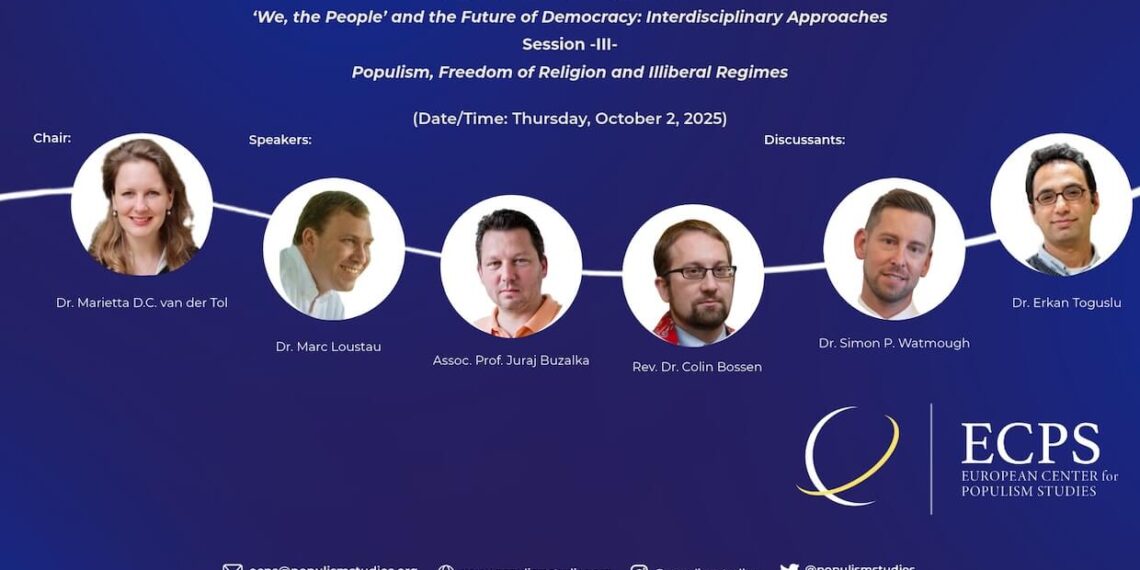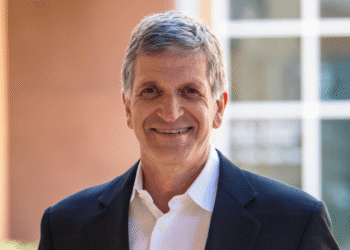On October 2, 2025, the ECPS, in collaboration with Oxford University, held the third session of its Virtual Workshop Series, “We, the People” and the Future of Democracy: Interdisciplinary Approaches. Chaired by Dr. Marietta D.C. van der Tol, the session examined how populist and illiberal actors across Hungary, Slovakia, and the United States instrumentalize the language of religious freedom to consolidate power and reshape national identity. Presentations by Dr. Marc Loustau, Dr. Juraj Buzalka, and Rev. Dr. Colin Bossen, followed by reflections from Dr. Simon P. Watmough and Dr. Erkan Toguslu, revealed how religion, once central to pluralism, is increasingly politicized as a weapon in culture wars and transnational illiberal strategies.
Reported by ECPS Staff
On October 2, 2025, the European Center for Populism Studies (ECPS), in collaboration with Oxford University, convened the third session of its Virtual Workshop Series titled “We, the People” and the Future of Democracy: Interdisciplinary Approaches. Session 3 explored the entangled relationship between populism, freedom of religion, and illiberal regimes. The session, chaired by Marietta D.C. van der Tol (Landecker Lecturer, University of Cambridge; Senior Postdoctoral Researcher, Trinity College, Cambridge), brought together a diverse set of perspectives, ranging from anthropological and theological insights to political and legal analyses. The session was opened with a welcome speech by ECPS intern Stella Schade, who introduced chair, speakers, and discussant on behalf of the Center.
In her framing remarks, Dr. van der Tol pointed to “the strong connection that we are seeing between, on the one hand, the rise of illiberalism, and on the other hand, the use of Christianity within the narratives that underpin the rise of illiberalism.” For too long, she noted, illiberalism has been seen as a phenomenon of Central and Eastern Europe, associated with Russia, Hungary, or Slovakia. While acknowledging the reasons for that association, she warned against a narrative that renders Eastern Europe “less good than Western Europe.” What made this session distinctive, she argued, was its inclusion of the United States, which allows scholars to “bridge the East–West divide on this matter” and explore illiberalism as a transnational, rather than regionally bounded, phenomenon.
To frame the discussion conceptually, Dr. van der Tol introduced the notion of “Christianism”—a politicized form of Christianity comparable to Islamism—drawing on Rogers Brubaker’s work. She emphasized that Christianism manifests not only at the level of ideas but “increasingly on the level of governance.” This, she suggested, requires interdisciplinary perspectives from politics, theology, anthropology, history, and law to grasp the shifting role of religion in illiberal politics.
The session featured three major contributions: Dr. Marc Loustau on Hungary’s instrumentalization of religious freedom, Dr. Juraj Buzalka on pragmatic politicization in Slovakia, and Rev. Dr. Colin Bossen on the incorporation of evangelical theology into Texas law. Their interventions were followed by commentary from discussants Dr. Simon P. Watmough and Dr. Erkan Toguslu, who drew comparative and theoretical connections across the cases.
Together, Session 3 illuminated how the language of religious freedom—once considered central to liberal democracy—has been appropriated by illiberal actors to mobilize cultural symbols, entrench political power, and reshape national and transnational identities.


